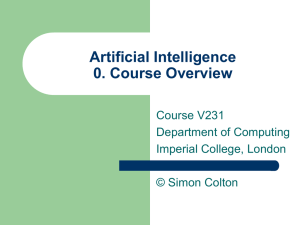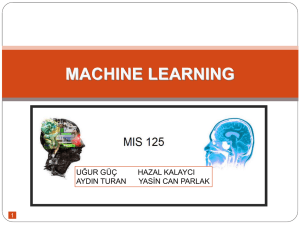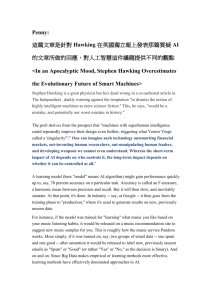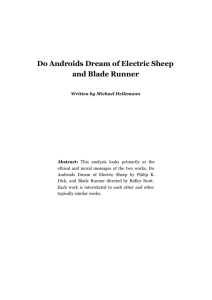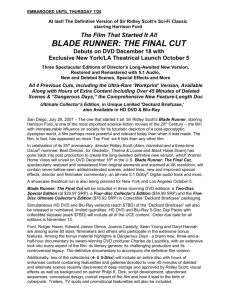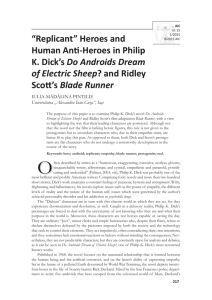Freshman Seminar: Artificial Intelligence in Film
advertisement
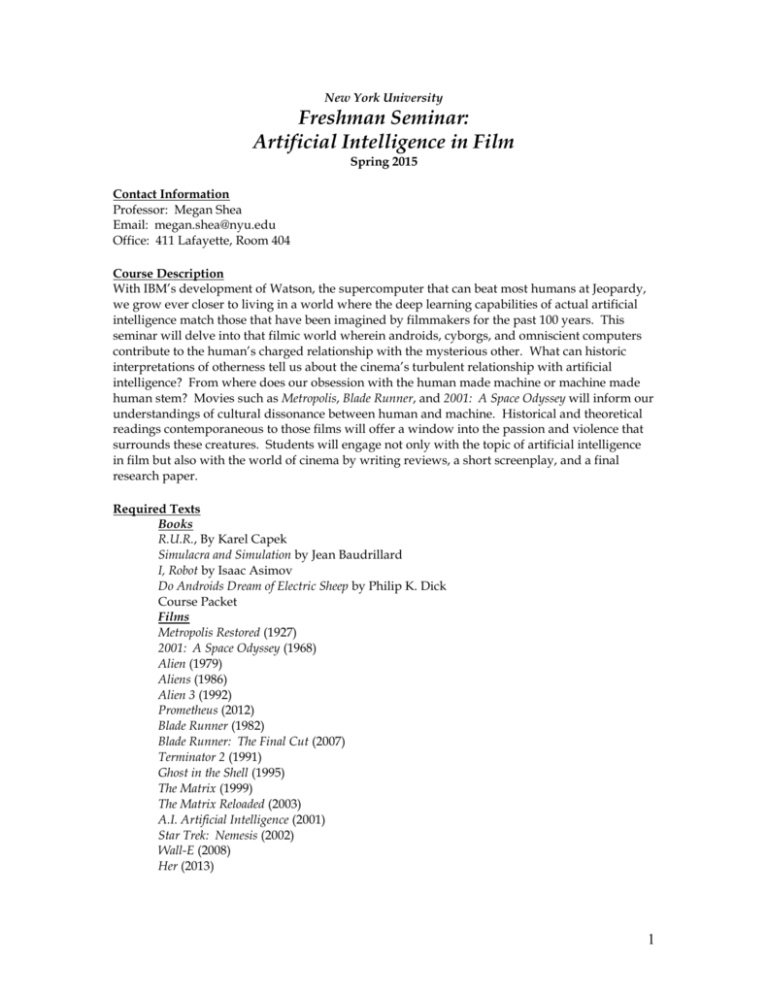
New York University Freshman Seminar: Artificial Intelligence in Film Spring 2015 Contact Information Professor: Megan Shea Email: megan.shea@nyu.edu Office: 411 Lafayette, Room 404 Course Description With IBM’s development of Watson, the supercomputer that can beat most humans at Jeopardy, we grow ever closer to living in a world where the deep learning capabilities of actual artificial intelligence match those that have been imagined by filmmakers for the past 100 years. This seminar will delve into that filmic world wherein androids, cyborgs, and omniscient computers contribute to the human’s charged relationship with the mysterious other. What can historic interpretations of otherness tell us about the cinema’s turbulent relationship with artificial intelligence? From where does our obsession with the human made machine or machine made human stem? Movies such as Metropolis, Blade Runner, and 2001: A Space Odyssey will inform our understandings of cultural dissonance between human and machine. Historical and theoretical readings contemporaneous to those films will offer a window into the passion and violence that surrounds these creatures. Students will engage not only with the topic of artificial intelligence in film but also with the world of cinema by writing reviews, a short screenplay, and a final research paper. Required Texts Books R.U.R., By Karel Capek Simulacra and Simulation by Jean Baudrillard I, Robot by Isaac Asimov Do Androids Dream of Electric Sheep by Philip K. Dick Course Packet Films Metropolis Restored (1927) 2001: A Space Odyssey (1968) Alien (1979) Aliens (1986) Alien 3 (1992) Prometheus (2012) Blade Runner (1982) Blade Runner: The Final Cut (2007) Terminator 2 (1991) Ghost in the Shell (1995) The Matrix (1999) The Matrix Reloaded (2003) A.I. Artificial Intelligence (2001) Star Trek: Nemesis (2002) Wall-E (2008) Her (2013) 1 Other readings will take the form of handouts in class or will be posted online through the library. Please print out all pdfs, and bring them to class with you. Course Requirements Reviews. In this class, you’ll write three reviews based on the films that you see. These review assignments will encourage you to move beyond a simple thumbs up or thumbs down assessment of the movie and into a larger evaluation of the films’ cultural value. The first two reviews will require multiple drafts and thus offer you a chance to understand how to rewrite in response to feedback. Screenplay. You will write a screenplay for a ten-minute film about a form of artificial intelligence. In this screenplay, you’ll creatively engage with the world of science fiction. Final Research Project. In this class, you will write a ten-page research essay on one of the films we view as part of this class. You are welcome to use the reviews you wrote in this class to inspire your topic. But you can also choose to develop your own scholarly concoction. The research project will consist of a prospectus and an annotated bibliography, a draft, and a final paper. You will be required to schedule and attend a draft conference with me. Grade Breakdown Review #1 15% Review #2 15% Review #3 15% Class Participation 10% Screenplay 15% Final Research Project 30% Guidelines for submission of written work. All assignments must be handed in through hard copies; electronic submissions will not be accepted. Type all your work; handwritten work is not acceptable. Your papers must use Calibri, Palatino, Times, or Times New Roman standard 12point font, be double-spaced, be stapled, use 1.25-inch margins on the sides, use 1-inch margins at the top and bottom, and include page numbers. At the top of the first page include your name, the date of submission, my name, and a title. Also, remember to proofread and spellcheck your work before bringing it to class. I suggest that you print out and staple your assignments the night before in order to avoid any last minute printer issues. Attendance. It is important that you come to classes prepared. Missed classes and tardiness will most likely have a negative effect on your grade. While absences for illness (documented with a doctor's note) and for religious holidays are excused, keep in mind that two absences may impact your grade and that three absences of any kind may result in failure of the course. You must see me about every absence. Classroom Decorum. The classroom is a place where the free exchange of ideas can occur in an atmosphere of mutual trust and respect. This includes problems such as non-performance of class obligations, disruptive or disrespectful behavior, and prejudice on the basis of gender, race or sexual orientation. According to the University policy on student conduct, “Behavior which…disrupts the educational activities…of the University, is subject to review and possible penalty.” NYU Classes. We will use NYU Classes in this course. Familiarize yourself with how to log on and use it. Assignments and announcements will be posted on NYU Classes. 2 Academic Integrity. Each student in this course is expected to abide by New York University’s Academic Integrity policies. Plagiarism and other forms of cheating will not be tolerated. For more information, see NYU’s Academic Honesty Policy http://www.nyu.edu/about/policiesguidelines-compliance/policies-and-guidelines/academic-integrity-for-students-at-nyu.html. If you have questions as to how to cite sources, see me. We will also discuss citing sources in class. Schedule of Assignments Week One: Introduction to Film Analysis January 28 In class watching and reading Week Two: Metropolis February 4 Metropolis Restored (1927) Childs, Peter. Introduction in Modernism. Mathiere, C. “The Golem.” Week Three: H.A.L. February 11 2001: A Space Odyssey (1968) Eco, Umberto. “The City of Robots.” Week Four: Androids and Aliens February 18 A mixture of the following: Alien (1979) Aliens (1986) Alien 3 (1992) Prometheus (2012) Week Five: To Be…or Not to Be? February 25 Blade Runner (1982) Blade Runner: The Final Cut (2007) Bruno, Giuliana. “Ramble City: Postmodernism and Blade Runner.” Holden, John. “More Human than Human.” Wave Magazine. Dick, Philip K. Do Androids Dream of Electric Sheep? Week Six: I’ll be back. March 4 Terminator 2 (1991) Harvey, Patricia. “Terminating the Father: Technology, Paternity, and Patriarchy inTerminator 2.” Week Seven: Contemplating Existence March 11 Ghost in the Shell (1995) Selections from Baudrillard, Simulacra and Simulation. Spring Break March 16-20 3 Week Eight: Success and Failure March 25 The Matrix (1999) The Matrix Reloaded (2003) Zizek, Slavoj. “The Matrix or Malebranche in Hollywood” Gopnik, Adam. “The Unreal Thing” Week Nine: Greek Musicality April 1 A.I. Artificial Intelligence (2001) Mulvey, Laura. “Visual Pleasure and Narrative Cinema.” Week Ten: I, Data April 8 Star Trek: Nemesis (2002) Bravo, Nicole Fernandez. “Doubles and Counterparts.” Week Eleven: I, Will Smith April 15 I, Robot (2004) Asimov, Isaac. I, Robot Week Twelve: Research April 22 Wall-E (2008) Readings T.B.A. Week Thirteen: Second Performance Viewing April 29 Her (2013) Readings T.B.A. Week Fourteen: Drafting Final Papers May 6 Writing: A draft of your final paper. 4
